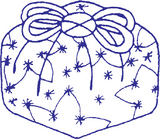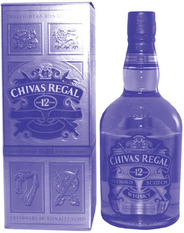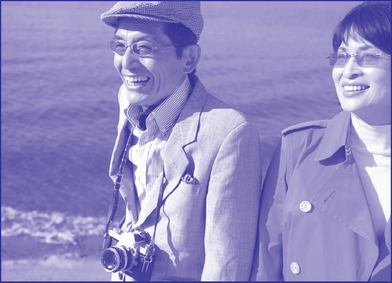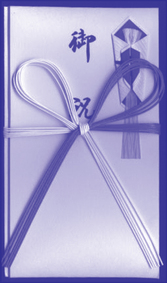
Learning to do as the Tokyoites do has always been good advice, because in Japan, as the gracious heroine in James Clavell’s classic novel Shogun* points out, there really are only Japanese ways. The good news for the visitor, however, is that the Japanese know how complicated and nuanced these ways can sometimes be and, happily, are invariably forgiving toward the foreigner’s faltering attempts to comply.
This is very much the case regarding the highly ritualized custom of gift-giving, which tends to cause more headaches and predeparture distress than any other aspect of the visit. It really should not cause so much angst. A gift in Japanese is referred to as o-miyage, literally “honorable present” (the “o” is honorific in Japanese), and in the final analysis your efforts to do the right thing will be appreciated by your Japanese hosts.
Essentially, gift giving in Japan is a form of “social lubricant” to smooth social interaction in the widest sense, including reinforcing existing relationships and mutual obligations. All of this has finally to do with nurturing and sustaining the all-important status quo and sense of well-being, be it within a company or organization, a family, or a neighborhood. Clearly, therefore, foreigners are not expected to know about these things, and, in any event, are not really part of this process. Nevertheless, gifts that foreigners make will be appreciated and mostly reciprocated.

Outside close personal and family relationships, a gift’s major function is not to do with “I have plenty, so let’s share,” or, “This is for you as a unique, special individual.” Rather, gifts serve as a device for the balancing of obligations, and as a continued reminder of the importance of the relationship.
If you are not sure about what type of gift to give to suit the level and status of the person who is to receive it, and in due course what type of gift to return, seek an insider’s view within the company or organization.
On receiving a gift, some Japanese might give you a token return gift of low value. Don’t panic—it has nothing to do with you being a foreigner. It is a kind of “receipt” for your gift—the real return gift will come later. Material gifts can also be given for nonmaterial favors. Seek advice, if necessary, to know whether they are regarded as “balancing.”
KEY GUIDELINES FOR GIFT GIVING
• Gifts should always be wrapped. The presentation of a gift, as with so many things in Japan, including food and ritual, is profoundly important. It comes as no surprise to learn, therefore, that gift wrapping itself is a highly regarded art form and widely practiced. Thus, don’t hesitate to ask a Japanese friend to wrap a gift you have brought with you, or you can purchase fancy paper and ribbons at stationery shops and department stores. Of course, if you buy a gift locally in Japan, the shop assistant will be delighted to gift wrap your “naked” gift for you.
• A gift once offered cannot be refused, except if it “smells” like a bribe, in which case it should be returned promptly.
• The Japanese usually belittle their gifts when presenting them. The “unworthy” receiver should in turn express reluctance and initially hesitate to accept it. However, this ritualized exchange has only one outcome, which is never in doubt.
• As a foreigner, you need not belittle your gift in quite the same way when presenting it. But neither should you praise it, nor indicate how much trouble or expense you have gone to acquire it, even if asked by your host to obtain it. This would be gauche and cause much embarrassment.
• Be careful not to give too valuable a gift, since equally expensive return presents are expected of the receiver. This process could continue over a period of time, and be burdensome and expensive for both parties.
• Friends and neighbors traditionally exchange gifts twice a year—at the midyear festival of o-bon and at year-end, o-seibo, but increasingly, the latter imitates the present-giving custom of Christmas.
• If you are invited to visit a private home, it is customary to present your host with a gift on leaving, not on arriving as in the West. By all means, apologize for the paucity of the gift, and don’t expect more than a simple thank you; to overdo these occasions with added layers of emotion is bad form. Once again, to avoid any embarrassment the gift will be opened after your departure.
• The Japanese traditionally do not open the gift in the presence of the giver. This allows face to be saved if it turns out to be much more (or less) expensive than was assumed to be the case, or is quite inappropriate. However, there may be times when you are urged to open your gift, which you should do graciously.
It is a well-known fact that gifts can “make the rounds” and there are plenty of jokes about one of your own gifts finding its way back to you via a circuitous route of exchanges. The fact is that the shops and supermarkets are so well geared to the gift-giving culture, with standard forms of packaging, that the chances are that you will know exactly what is in the package without having to open it, and can therefore put it to one side for a future ritual presentation.
Given the quantity of gifts that could be exchanged over the years, families and individuals sensibly keep a record of gifts received and given in order to avoid the obvious pitfalls of “thoughtless” duplication.
Of course, there are situations when gifts are not reciprocated because they are mutually perceived as simple expressions of gratitude. These would include the gifts pupils give to their teachers, or the gifts shopkeepers give their customers, or the corporate gifts given to visitors at a car factory, for example, or by an airline (in anticipation of your custom).
As a foreigner, there will be times when you receive a gift unexpectedly and have no way of reciprocating. This should not be a matter of concern that sends you into a dizzy spin. Just ensure you leave with full details of the giver. A tasteful card sent in thanks on your return home, perhaps with a copy of the photograph you may have taken at the time, will be much appreciated.
Avoid groups of objects (for example, coasters, table mats, or miniature liqueurs) that add up to a series of four or nine: these numbers symbolize death or misfortune. Remember, too, that congratulatory presents are wrapped up in red and white; whereas condolence or memorial gifts are wrapped up in black, blue, or green, and white.
Try to buy a number of gifts in your hometown, ranging from expensive to inexpensive. Small mementos—even picture postcards of your hometown—are appreciated as tokens of kindness shown.
If you come from an historic town or city (or live close enough to one), or one famous for particular products, then purchase a variety of souvenirs to take with you. These will be most useful gifts and are always well received. You would be well advised to rehearse what you will say about such gifts and the historical context to which they are linked. Keep these observations brief and to the point. (The great cathedral cities of England, for example, always have wonderful gift shops in the precincts of the cathedral.)
At the top of your gift list could be high-quality whiskey. Buy the boxed bottles and take the maximum allowed into Japan (currently three). Chivas Regal as well as quality malts are preferred. Napoleon Brandy is also a good, but expensive, choice. High-quality teas, confectionery, and preserves—such as marmalade, appropriately boxed—make excellent gifts, too, especially if you are likely to be introduced to the wives of Japanese businessmen. And if you run out of such gifts, you can invariably restock at a Japanese department store, albeit at considerably inflated prices.

Not as readily available in Japan are branded luxury foodstuffs such as those from upscale stores in London and New York, so gifts made by these suppliers carry additional status. Other suggestions include silk ties and scarves, commemorative coin or stamp sets, and good-quality illustrated books. Cuff links and tie tacks, incidentally, should be avoided since few Japanese men wear them, but commemorative T-shirts could be a good alternative. Since Japanese business inhabits the world of golf, there could be gift options here, although perhaps only a few that are affordable. Duty-free shops in airports from which there is a direct connection with Japan usually stock these boxed gifts. But avoid relying on buying in-flight, since the whiskey bottles tend to be plastic and not boxed.
Given the Japanese preoccupation with gift-giving, which changes into high gear if foreign trips are involved, it will come as no surprise to learn that there are special “overseas” gift shops at the main airports in Japan that allow the traveler to purchase items before departure—and collect them, all suitably gift wrapped, on return—thus dispensing with the bother of buying them while abroad and bringing them back home: this is another wonderful example of the Japanese “systematic approach” to problem-solving!
The Japanese are the world’s number one photographers. Indeed, it is virtually unthinkable that any special event should take place without it being photographed. This is especially true of the group photograph taken on overseas trips, which will be a familiar sight to many host countries around the world. Equally, if you take an “event” photograph when in Japan, a mounted copy of it will always be gratefully received by your host on your return (though don’t be distressed if it is never acknowledged).

Don’t admire excessively some art object or item in your host’s house or office—it might be read as a signal that you want it and they may feel obliged to give it to you!
Another aspect of Japanese gift-giving is the custom of giving gifts in times of danger, distress, and disorder. Gifts (invariably money presented in money “gift” envelopes) are made by friends, family, and neighbors to people in hospital or who have been injured, or to those who have suffered disaster, from fire, flood, or earthquake. The convention is, however, that following recovery and a return to normality the recipient of the gift will be expected to use up to half the cash received in a reciprocal “thank you, all is well” gift.

Such practices reinforce the fundamental interconnectedness of Japanese society, and may well have roots in the Shinto tradition of appeasing of the gods, responsible for such calamities or distress.
In recent years, Japan’s gift-giving calendar has been augmented by the inclusion of a Japanese version of Saint Valentine’s Day. This has become a sort of chocolate-frenzy day, when girls give gifts of dark chocolate products to the boys of their choice. On “White Day,” one month later, boys give white chocolate products to the girls of their choice. In the weeks leading up to these two events, department stores and supermarkets mount fantastic mouthwatering displays of wrapped and unwrapped chocolate products.

* Based very sketchily on the story of the first Englishman to reach Japan. William Adams, from Gillingham, Kent (renamed John Blackthorn in the novel), was washed ashore as a result of shipwreck in 1600. Although Clavell undertook considerable research of the Edo period to write the book, it does not claim to be a work of scholarship.